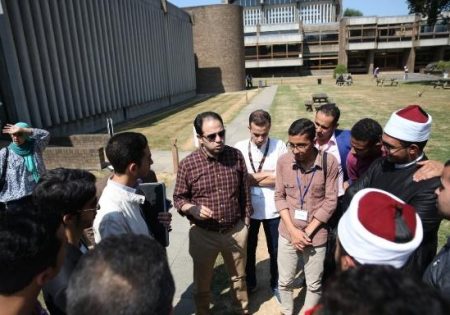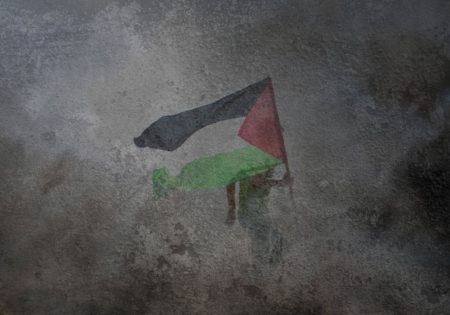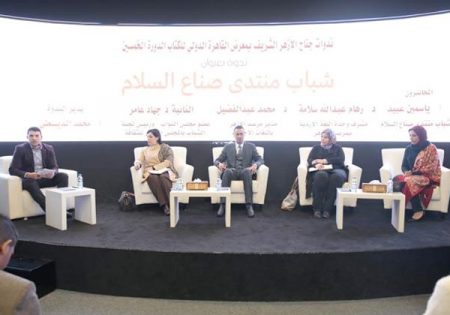General Context:
The Muslim Council of Elders (MCE) is organizing the Interfaith Pavilion at the United Nations Framework Convention on Climate Change (COP 28) to be an inclusive platform for religious institutions and leaders. This is an attempt to engage followers of religions in confronting climate change and to promote the role of renowned religious figures in achieving climate justice, for the first time in the history of the UNFCCC. This also comes out of belief in the role of religions and their leaders in leading a more effective role in combating climate change.
Since the Muslim Council of Elders is keen to organize the COP 28 Interfaith Pavilion in such a way that enables its impact to reach various parts of the world, starting from the land of the United Arab Emirates (the host country), the MCE General Secretariat has decided to support and finance creative youth initiatives and projects. This decision helps achieve the goals of the Emerging Peacemakers Forum in its second edition, which included supporting and launching of 5-8 initiatives led by youth who work on issues related to sustainable development, the Human Fraternity Document and climate change.
We are pleased to receive applications from individuals, youth institutions, and civil society organizations who can submit proposals for initiatives and projects in the fields of climate, environment, and human fraternity, and obtain technical and financial support of up to $3,000 (maximum) for each creative initiative. Through this call, the MCE seeks to encourage and support young people in presenting and implementing ideas and projects that contribute to confronting climate change and enhancing the participation of youth and women in confronting it.
Areas of participation:
The first main area, climate change and climate justice, includes three elements:
- Natural environment and heritage protection
How to identify more effective mechanisms for preserving the environmental and natural heritage in the Mediterranean region. This includes preserving biodiversity and the richness of wildlife as well as marine life.
- Green Economy
Promoting and sustaining the green economy within the framework of reducing environmental risks and achieving sustainable development and green entrepreneurship.
- Climate Adaptation and Financing:
Mechanisms and ways to enhance funding the projects aimed at mitigating the effects of climate change, with a focus on including these solutions for low-income developing countries.
The second main area, social inclusion, includes two elements:
- Inclusion of young people with limited opportunities who are at risk of being affected by climate change:
Analyzing the best regional and international policies to empower and integrate young men and women with limited opportunities in facing climate change and enhancing their involvement in decision-making processes.
- Public policies:
Providing and developing policy papers and position assessments to enhance the dimensions of social inclusion in climate change issues and to create a more equitable society and address the root causes of social inequality and discrimination, ensuring that all individuals have equal access to resources and opportunities.
The third main area, capacity building, includes two components:
This field focuses on ways to empower youth voices, build multi-generational connections, and promote effective participation.
- Climate education and training:
Exchanging views, recommendations, and proposals to develop vocational education and training programs and policies to enhance green employment opportunities for young people with higher educational qualifications. It also focuses on modern skills (i.e. digital and green skills) and how to integrate them into vocational education and training curricula geared to climate and environmental issues.
- Entrepreneurship and self-employment:
Considering issues of small and medium projects with an environmental dimension and promoting a culture of entrepreneurship as a path to confront climate change.
The fourth main area, the role of religions in confronting climate change, includes three elements:
- Religions and Environmental Responsibility:
Disseminating the importance of the values and directives brought by religions and moral-religious principles in promoting environmental responsibility at the individual and collective levels, and reducing environmental problems of all types and effects, and ways to address them.
- Renowned religious figures and climate justice:
Considering the importance of religious figures and leaders and involving them in addressing environmental issues on a large scale/outreach effectively and working to support and achieve climate justice.
- Human fraternity:
An in-depth and comprehensive application of what the Human Fraternity Document came up and its call for mitigating effects of climate change, and how to address them as a source of threat to all humanity.
- Age: Applicants (minimum of two) must be aged between 18 and 30 to ensure that support is directed at young people.
- Peaceful nature: Proposals must be of a peaceful and constructive nature, aiming to promote peace and security without contradicting the values and principles of the International Declaration of Human Rights.
- Clarity and specificity: Proposals must include clear and specific goals, with a precise description of the proposed steps to achieve these goals.
- Positive impact: The proposal must have a positive impact on society, and deal with issues related to climate, environment, and human fraternity.
- Accommodation to community: The proposal must be compatible with the challenges and problems facing the community and the local context in which it is implemented.
- Inclusion and diversity: The proposal must consider the environmental and humanitarian dimensions during the submission, implementation and sustainability phases; that is, it should take into account the environmental impacts resulting from its activity and achieves the maximum benefit from the integration of all segments of society, regardless of gender, race, color, religion, belief, physical abilities, or social status.
- Membership of the Emerging Peacemakers Forum (EPF): One of the applicants from the work team must be a member or graduate of the EPF.
| criterion | description | Percentage |
|---|---|---|
| Impact and effectiveness | The extent to which the proposal can achieve a measurable positive impact in the areas of climate, environment, and human fraternity. |
15% |
| creativity and innovation | The uniqueness of the proposal and its ability to provide a new approach or creative solution to a particular problem. |
20% |
| Clarity and detail | The clarity and details of the proposal, including the objectives and steps proposed to be achieved. |
10% |
| Sustainability | The project’s ability to continue and achieve long-term results | 20% |
| Ability to implement | Evaluating the applicant’s ability to successfully implement the proposal, considering starting implementation before the start of COP 28 activities. |
20% |
| Feasibility | The extent of the project’s realness and feasibility from a financial and operational perspective. |
15% |
3- Selection stages:
– Submission of applications: Applicants submit their applications and proposals according to the specified conditions.
– Evaluation of applications: A specialized evaluation committee reviews and evaluates all applications according to the specified evaluation criteria.
– Choosing winners: Proposals that are consistent with the criteria and that demonstrate the ability to achieve a clear positive impact are selected.
– Announcing results: The winning projects are announced, and technical and financial support is provided to them.
– Project implementation: The implementation of the winning projects is followed up with technical and financial support to ensure the achievement of the specified goals.
Key dates:
| Activity | Date |
|---|---|
| Submissions | August 30, 2023 – 23:00 GMT |
| Organizing an introductory session about the forum and answering inquiries | Click here to go to the registration page. |
| Submission deadline | September 30, 2023 – 23:00 GMT |
| Sorting and evaluation | October 1 – October 30, 2023 |
| Notifying those accepted for the final stage | By mid-October 2023 |
| The period of implementation of initiatives and projects concurrently with COP 28 | November 25 – December 15, 2023 |
| A closing conference to be held to announce the results | February 2024 |
Who can participate?
Young men and women working in civil society, and international organizations, and people who have an influence in their communities and a positive role in building peace and resolving disputes and conflicts, whether by participating in dialogue, negotiation, mediation, or facilitating dialogue. Proposals are submitted through groups (minimum of two individuals in each group), provided that at least one individual among the applicants hold a membership or is a graduate of the EPF.
Financing:
Five initiatives will be funded according to an estimated budget of $3,000 for each initiative, considering the geographical dimension of the selected initiatives.
Notes:
While selecting the final list of initiatives, geographical balance, and fair representation of youth of both genders will be considered. The organizers welcome applications from all candidates who meet the admission requirements, regardless of gender, disability, social status, race, color, religion, or belief. Organizers also encourage young men and women with fewer opportunities, such as those living in rural, border or informal areas who face social, geographic, economic, or material challenges.
For more information about the Emerging Peacemakers Forum, please visit the Emerging Peacemakers website.
How to apply:
Those wishing to participate must complete the project description form and the budget form below in this link. Please note that applications received through other methods will not be considered. We also advise you to apply as soon as possible, as applications are reviewed on a first-come, first served basis.



